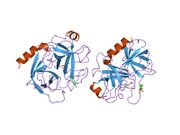Biology:Trypsin 1
 Generic protein structure example |
Trypsin-1, also known as cationic trypsinogen, is a protein that in humans is encoded by the PRSS1 gene. Trypsin-1 is the main isoform of trypsinogen secreted by pancreas, the others are trypsin-2 (anionic trypsinogen), and trypsin-3 (meso-trypsinogen).
Function
This gene encodes a trypsinogen, which is a member of the trypsin family of serine proteases. This enzyme is secreted by the pancreas and cleaved to its active form in the small intestine. It is active on peptide linkages involving the carboxyl group of lysine or arginine. Mutations in this gene are associated with hereditary pancreatitis. This gene and several other trypsinogen genes are localized to the T cell receptor beta locus on chromosome 7.[1]
Clinical significance
Its malfunction acts in an autosomal dominant manner to cause pancreatitis. Many mutations that can lead to pancreatitis have been found.[2][3][4][5] An example is a mutation at Arg 117. Arg 117 is a trypsin-sensitive site which can be cleaved by another trypsin and becomes inactivated. This site may be a fail-safe mechanism by which trypsin, when activated within the pancreas, may become inactivated. Mutation at this cleavage site would result in a loss of control and permit autodigestion, causing pancreatitis.[6]
See also
References
- ↑ "Entrez Gene: PRSS1 protease, serine, 1 (trypsin 1)". https://www.ncbi.nlm.nih.gov/sites/entrez?Db=gene&Cmd=ShowDetailView&TermToSearch=5644.
- ↑ "An overview of hereditary pancreatitiss". Digestive and Liver Disease 44 (1): 8–15. 2011. doi:10.1016/j.dld.2011.08.003. PMID 21907651.
- ↑ "Mutations of the cationic trypsinogen in hereditary pancreatitis". Hum. Mutat. 12 (1): 39–43. 1998. doi:10.1002/(SICI)1098-1004(1998)12:1<39::AID-HUMU6>3.0.CO;2-P. PMID 9633818.
- ↑ "Molecular basis of hereditary pancreatitis.". Eur. J. Hum. Genet. 8 (7): 473–9. 2000. doi:10.1038/sj.ejhg.5200492. PMID 10909845.
- ↑ "Mutations in the cationic trypsinogen gene are associated with recurrent acute and chronic pancreatitis". Gastroenterology 113 (4): 1063–8. 1997. doi:10.1053/gast.1997.v113.pm9322498. PMID 9322498.
- ↑ "Hereditary pancreatitis is caused by a mutation in the cationic trypsinogen gene". Nature Genetics 14 (2): 141–5. 1996. doi:10.1038/ng1096-141. PMID 8841182.
Further reading
- "Gene conversion-like missense mutations in the human cationic trypsinogen gene and insights into the molecular evolution of the human trypsinogen family.". Mol. Genet. Metab. 71 (3): 463–9. 2000. doi:10.1006/mgme.2000.3086. PMID 11073713.
- "Molecular pathology and evolutionary and physiological implications of pancreatitis-associated cationic trypsinogen mutations.". Hum. Genet. 109 (3): 245–52. 2001. doi:10.1007/s004390100580. PMID 11702203.
- "Cationic trypsinogen mutations and pancreatitis.". Clin. Lab. Med. 25 (1): 39–59. 2005. doi:10.1016/j.cll.2004.12.004. PMID 15749231.
- "Genetic issues in pediatric pancreatitis.". Current Gastroenterology Reports 8 (3): 248–53. 2006. doi:10.1007/s11894-006-0083-8. PMID 16764792.
- "Isolation of a cDNA encoding a human serum marker for acute pancreatitis. Identification of pancreas-specific protein as pancreatic procarboxypeptidase B.". J. Biol. Chem. 267 (4): 2575–81. 1992. doi:10.1016/S0021-9258(18)45919-4. PMID 1370825.
- "CD4-binding regions of human immunodeficiency virus envelope glycoprotein gp120 defined by proteolytic digestion". Proc. Natl. Acad. Sci. U.S.A. 88 (24): 11320–4. 1992. doi:10.1073/pnas.88.24.11320. PMID 1763044.
- "The reactive site of human alpha 2-antiplasmin". J. Biol. Chem. 262 (13): 6055–9. 1987. doi:10.1016/S0021-9258(18)45536-6. PMID 2437112.
- "Immunoreactive anionic and cationic trypsin in human serum". Clin. Chim. Acta 184 (1): 31–46. 1990. doi:10.1016/0009-8981(89)90254-4. PMID 2598466.
- "Cloning, characterization and nucleotide sequences of two cDNAs encoding human pancreatic trypsinogens". Gene 41 (2–3): 305–10. 1986. doi:10.1016/0378-1119(86)90111-3. PMID 3011602.
- "Chromosomal assignments of human genes for serine proteases trypsin, chymotrypsin B, and elastase". Somat. Cell Mol. Genet. 10 (4): 369–76. 1984. doi:10.1007/BF01535632. PMID 6589790.
- "Limited tryptic digestion near the amino terminus of bovine liver rhodanese produces active electrophoretic variants with altered refolding". J. Biol. Chem. 268 (21): 15611–20. 1993. doi:10.1016/S0021-9258(18)82300-6. PMID 8340386.
- "The complete 685-kilobase DNA sequence of the human beta T cell receptor locus". Science 272 (5269): 1755–62. 1996. doi:10.1126/science.272.5269.1755. PMID 8650574. Bibcode: 1996Sci...272.1755R.
- "Crystal structure of human trypsin 1: unexpected phosphorylation of Tyr151". J. Mol. Biol. 259 (5): 995–1010. 1996. doi:10.1006/jmbi.1996.0376. PMID 8683601.
- "The properties of the protein tyrosine phosphatase PTPMEG". J. Biol. Chem. 271 (44): 27751–9. 1996. doi:10.1074/jbc.271.44.27751. PMID 8910369.
- "Assignment of a single disulphide bridge in human alpha2-antiplasmin: implications for the structural and functional properties". Biochem. J. 323 (Pt 3): 847–52. 1997. doi:10.1042/bj3230847. PMID 9169621.
- "Expression, purification, and inhibitory properties of human proteinase inhibitor". Biochemistry 36 (48): 14874–82. 1998. doi:10.1021/bi970977p. PMID 9402754.
External links
- GeneReviews/NCBI/NIH/UW entry on PRSS1-Related Hereditary Pancreatitis
- Overview of all the structural information available in the PDB for UniProt: P07477 (Human Trypsin-1) at the PDBe-KB.
This article incorporates text from the United States National Library of Medicine, which is in the public domain.
 |


